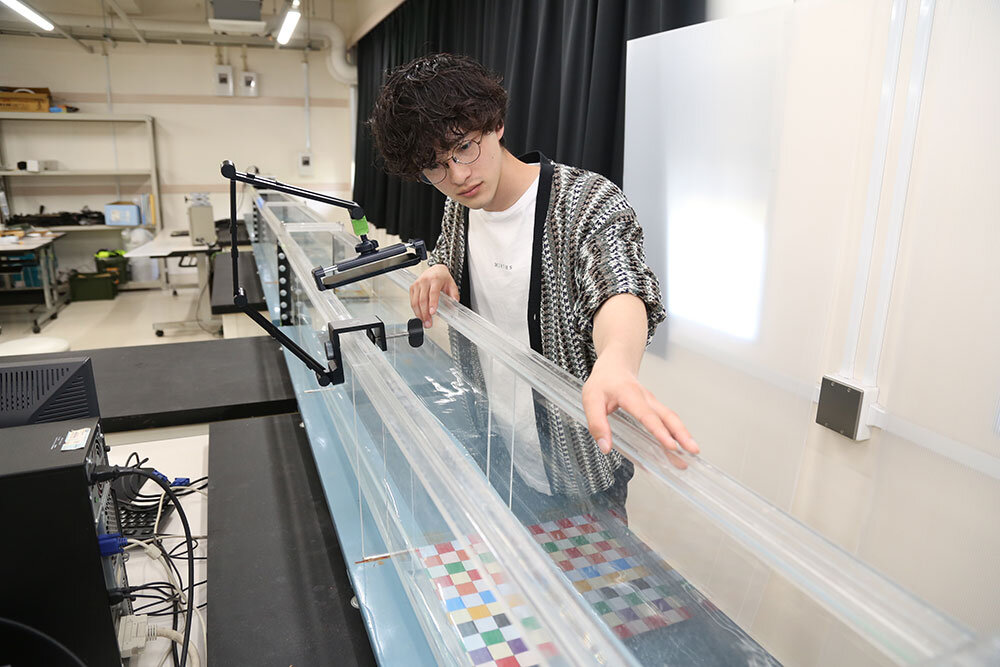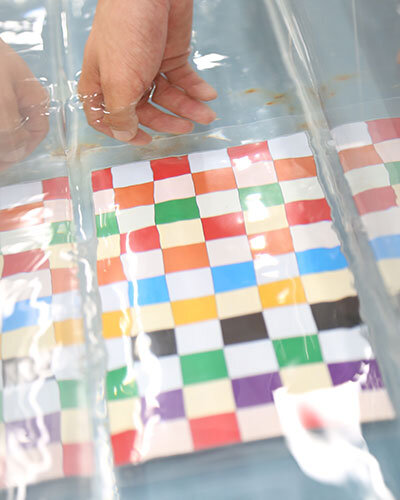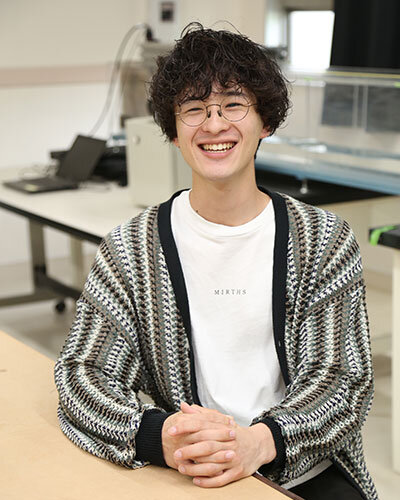INTRODUCTION学生紹介
- HOME
- support
- Student Introduction
- ITO ASUKA
STUDENT INTRODUCTION
Marine Resources and Environment
ITO ASUKA
Specializations:Marine Resources and Energy
Main academic advisor:OKAYASU, Akio
Mentor:LIANHUI, Wu

Always thinking about research and studies, even while in the sauna
Capturing underwater scenes from the air and three-dimensionally reconstructing them by removing surface distortions
I am researching the 3D imaging of underwater scenes from the air, even with waves present. As an undergraduate, I conducted this research without using AI, but I plan to incorporate AI during my graduate studies.
 Light refracts and reflects at the water's surface, causing distortions. We recognize these distortions and understand that there is a water surface there, but cameras generally cannot capture the water surface itself. When trying to image the surface of the water, I thought that the distortions of objects underwater could determine the shape of the water's surface. This led to my current research.
Light refracts and reflects at the water's surface, causing distortions. We recognize these distortions and understand that there is a water surface there, but cameras generally cannot capture the water surface itself. When trying to image the surface of the water, I thought that the distortions of objects underwater could determine the shape of the water's surface. This led to my current research.
I believe that this research could help with methods and means of inspecting underwater structures. Currently, there are no clear standards for inspecting and repairing underwater structures; they are simply built and left as is. Even if inspections are conducted, divers must go underwater and visually inspect the structures, which is time-consuming and leads to insufficient inspections. If we could use drones that can three-dimensionally confirm underwater objects even in the presence of waves, we could immediately understand the condition of underwater structures. Since it would be less time-consuming, inspections could be conducted more frequently, which should help resolve problems faced by underwater structures.
Understanding classes by watching all past lessons to grasp the overall picture
A senior lab member already in the WISE Program encouraged me to join it. Since I had always wanted to use AI in my research, I decided to join the program.
The senior told me that the WISE Program offers comprehensive classes related to AI and that participants can make robots operate automatically, which sounded interesting to me.
I started studying AI only after joining the WISE Program. The classes began with mathematical formulas, so at first, I thought, "This is difficult; I don't understand what we're doing." Around that time, the instructor told us about videos summarizing the class content, and I decided to watch them all the way through to grasp the overall picture. This helped me understand how the topics covered in class were connected, and the dots started to connect.
I then focused on studying the parts that seemed necessary for me, which made the classes more comprehensible. With that knowledge, I recently tried creating a program that uses AI to restore images.
I really want to do image processing, but I don't have the required skills yet, so I need to improve. However, I think I've at least created a starting point.
Actively interning to learn about companies' visions and utilize them in research
 The WISE Program has a wealth of teaching materials, including videos of past lectures, which is very helpful for quick learning. The program also has a mentoring system that allows students to contact and ask questions to faculty members specializing in AI and machine learning. As I try to delve deeper into learning AI and machine learning, I appreciate having such a system in place.
The WISE Program has a wealth of teaching materials, including videos of past lectures, which is very helpful for quick learning. The program also has a mentoring system that allows students to contact and ask questions to faculty members specializing in AI and machine learning. As I try to delve deeper into learning AI and machine learning, I appreciate having such a system in place.
I am also paying attention to the matching week. This system allows students to participate in internships after being matched with companies, providing a valuable opportunity to learn about companies' visions.
The matching week consists of three sessions between companies and students. If matched during the third session, an internship is secured. I have completed the second session and am trying to decide which companies I want to speak with in the third session. I want to participate in an internship, so I am currently making offers to proceed to the third session.
I would like to intern at a company that deals with underwater drones. In my research, I capture images of the water surface from the air and create distortion-free underwater images. Geotagging, indicating the camera's location when the images were captured, is crucial. The captured images contain the camera's location data, but it disappears when AI is applied. The internship I am aiming for would be to investigate the location of underwater drones when they capture images. Determining the location where images were captured can be applied to my own research, so I definitely want to participate. I have also heard that there have been programming camps in past internships. If such opportunities arise, I would like to participate as well.
Able to reduce part-time work and increase research time thanks to financial support
I usually arrive at school around 10:00 a.m. and conduct research until 6:00 p.m. if I have part-time work or until around 9:00 p.m. if I don't. I work part-time three days a week at an izakaya (Japanese-style pub) and as an online tutor. The WISE Program provides financial support, which has allowed me to reduce my part-time work and increase the time I dedicate to research. If it weren't for the program's financial assistance, I might have had to work part-time about two more days per week. I want to devote myself to both research and studying AI. Therefore, being able to allocate the time I've saved from part-time work to research and studying is a significant benefit. I am very grateful for it.
Amid my busy schedule of research, studying, and part-time work, I enjoy going to the sauna. I relax there but also think about my studies and research while in the sauna. Sometimes, I have epiphanies or gain understanding there. In fact, I think about research and studying even while walking. That's how engrossed I am in my research and studies.

